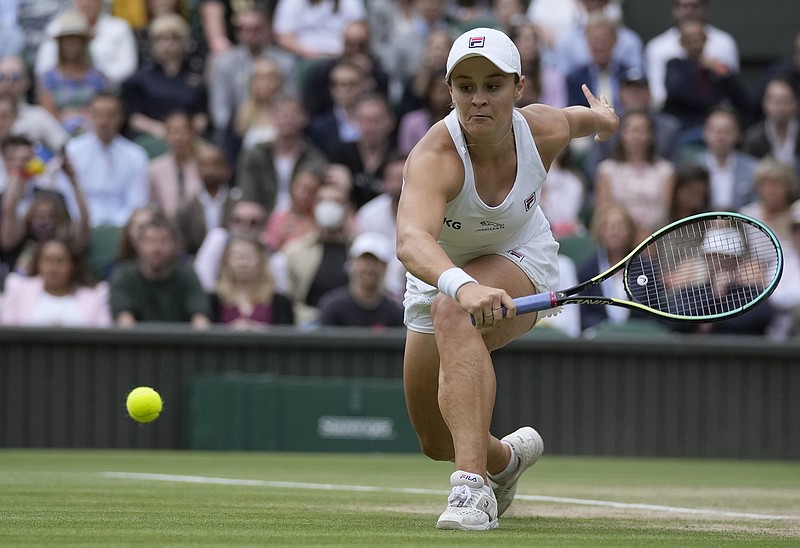WIMBLEDON, England - Everything came so easily for Ash Barty at the start of her first Wimbledon singles final. It was hard to believe one player would win the first 14 points of a major championship match.
Surely it couldn't stay that one-sided, right? Of course not.
Still, Barty used that perfect start and a strong enough finish to get the job done, holding off Karolina Pliskova's comeback bid to win 6-3, 6-7 (4), 6-3 at the All England Club on Saturday for her second Grand Slam singles title.
"It took me a long time to verbalize the fact that I wanted to dare to dream it and say I wanted to win this incredible tournament. ... I didn't sleep a lot last night. I was thinking of all the what ifs," said Barty, who has been the WTA's top-ranked player since September 2019. "But I think when I was coming out on this court, I felt at home in a way."
She adds this trophy to the one she won as the French Open women's singles champion in 2019. She also won a Grand Slam doubles title by partnering with CoCo Vandeweghe at the 2018 U.S. Open.
Barty is the first Australian woman to win Wimbledon since Evonne Goolagong Cawley in 1980. Barty was a teenager when they first met, and she considers Goolagong Cawley an inspiration and a mentor.
"Evonne is a very special person in my life," said Barty, whose attire for the final was a tribute to the dress Goolagong Cawley wore in 1971 when she won her first of two Wimbledon singles titles. "I think she has been iconic in paving a way for young indigenous youth to believe in their dreams and to chase their dreams. She's done exactly that for me as well."
Barty, 25, was a Wimbledon junior champion a decade ago, but in 2014 she left tour tennis for nearly two years because of burnout. She played professional cricket back home, then eventually returned to her other sport.
Good call.
She was at her best at the beginning of each set against the eighth-seeded Pliskova, a 29-year-old from the Czech Republic with a big serve. Pliskova dropped to 0-2 in major finals; she also was runner-up at the 2016 U.S. Open.
"Horrible start," said Pliskova, a former WTA No. 1. "That's why I'm more, like, proud about the way (I found) a way back in that match."
She trailed by a set and a break in the second, and Barty served for the victory at 6-5. Barty sailed consecutive forehands long to get broken, though, then ceded the tiebreaker with a double fault.
"She dug deep," Barty said, "and found a way to claw herself back into the match."
In the first Wimbledon women's final to go three sets since 2012, Barty went up 3-0 in the decider and never relented. It also was the first since 1977 between two participants who never had been that far in the grass court major.
The finalists smiled and chatted during the coin toss before their match, but once things got serious, Barty didn't mess around.
There was not a hint of uneasiness or uncertainty. Her strokes were confident. Her demeanor, too. During the match-opening run that put her up 3-0, love-30 and, after Pliskova finally won a couple of points, 4-0 after 11 minutes, Barty showed off her varied skills.
She returned Pliskova's speedy serves - the ones that produced a tournament-high 54 aces entering Saturday - without any trouble. The 5-foot-5 Barty lobbed at Pliskova, who is 6-foot-1. She hit winners with heavy topspin forehands and set up others with sliced backhands. She threw in an ace of her own, and even compiled more than Pliskova, 7-6.
"She didn't really miss much. She played everything super deep," Pliskova said. "I think it was tough for me to really play my game in that moment."
The key stat probably was this: Barty won 22 of 31 points that lasted nine strokes or more.
As balls flew past Pliskova and the murmuring in the full-capacity stands reached a crescendo, she watched with little more than a blank stare. She fiddled with her racket strings as if she'd rather be anywhere else and, indeed, said afterward: "I didn't feel like I (wanted) to be there."
Pliskova's coach, Sascha Bajin, who previously worked with Naomi Osaka and was Serena Williams' hitting partner, observed the scene with arms crossed.
Pliskova finally got the measure of her strokes in the second set. That could have shaken Barty. Except here's the thing: She speaks clearly about never letting anything get her too down, including the hip injury that knocked her out of the French Open last month and prevented her from her usual preparation for Wimbledon.
Actually, it wasn't until after Saturday's win that Barty's team told her that hip was much worse than she knew and should have required two months for a full recovery.
And so, with her typical grit, Barty managed to get back to the steadier version of herself down the stretch. When she got a second chance to serve it out, Barty didn't flinch, even when she had to stare down a break point.
When one last backhand miss from Pliskova ended the game, set and match, Barty crouched at the baseline and covered her face with her arm.
"Being able to reset at the start of the third was really important, just for me to continue to turn up each and every point," said Barty, who climbed into the stands to hug her coach, Craig Tyzzer, and others. "That's all I was really focusing on, just trying to do the best I could every given point, regardless of what the scoreline was."
